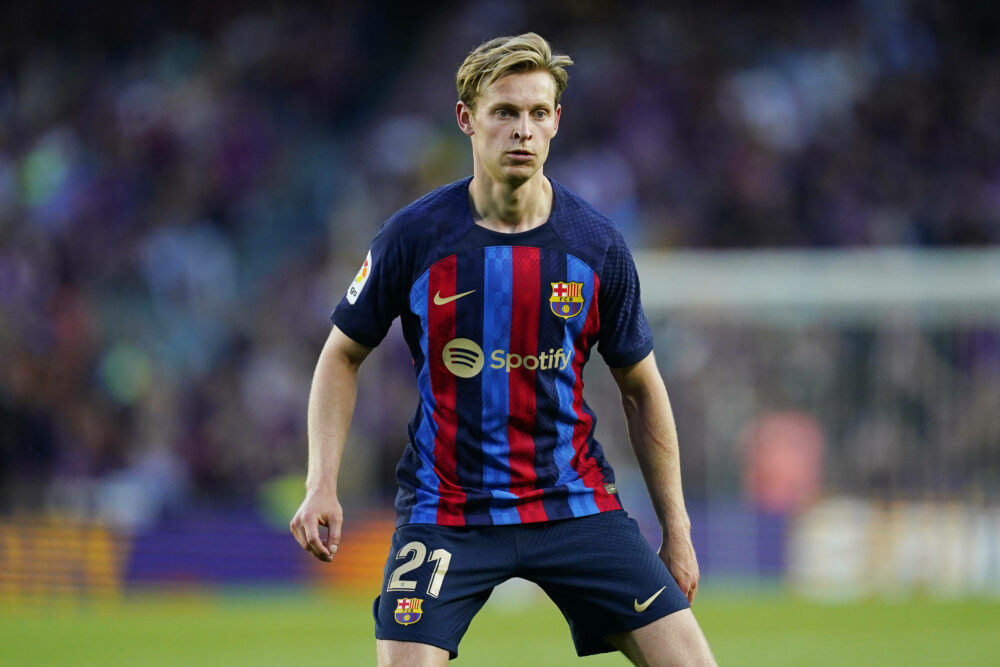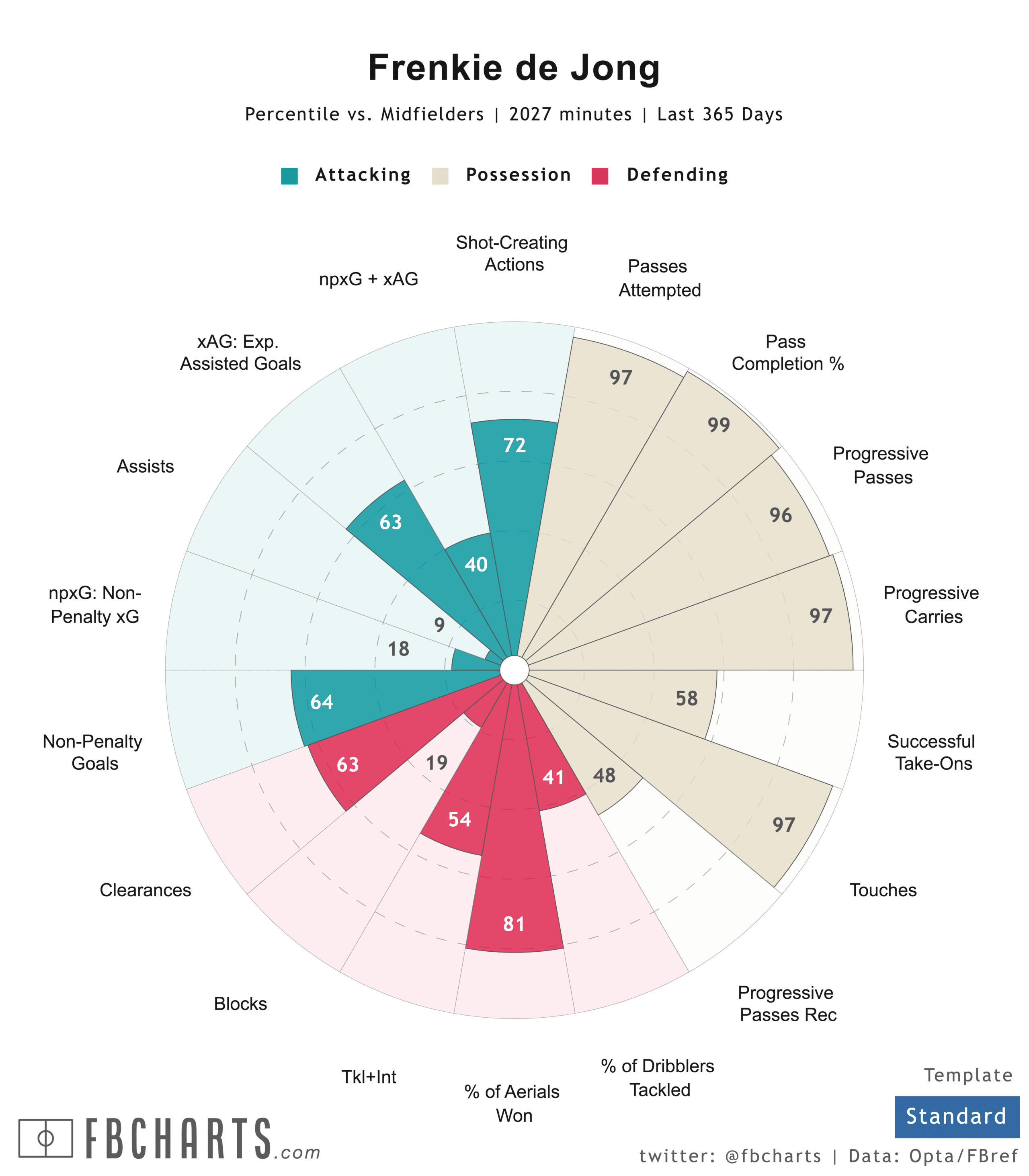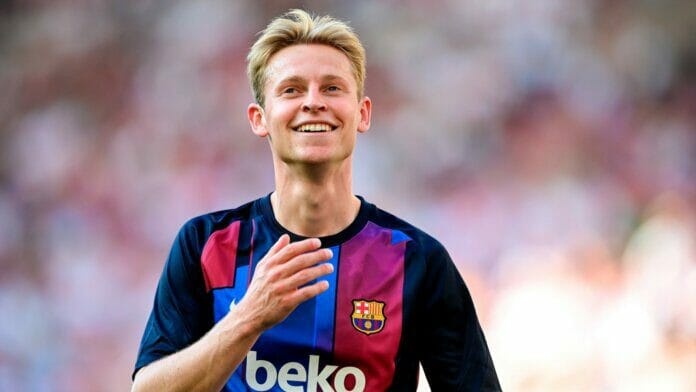Frenkie de Jong Open to Barcelona Exit Amid Financial Struggles
Frenkie de Jong’s future at Barcelona seems increasingly uncertain as the club grapples with their ongoing financial difficulties. The Dutch midfielder, once firm in his resolve to remain at his “dream club,” now appears more open to leaving Camp Nou, provided certain conditions are met. Steve Kay at FootballTransfers reports that Barcelona are willing to pay de Jong his deferred wages, totalling €18 million, on the condition that he agrees to leave in the summer.
Barcelona’s Financial Struggles Behind the Move
Barcelona’s financial issues have been widely reported, with the pandemic exacerbating their already precarious situation. To help the club during this challenging period, de Jong deferred a significant portion of his salary, yet the burden of his wages remains considerable. The midfielder, under contract until 2026, earns €1.1 million per week, including bonuses, making him the club’s highest-paid player. This significant wage bill is something Barcelona, under intense financial pressure, is eager to reduce.
The club sees de Jong’s potential departure as a way to alleviate their wage constraints, potentially freeing up funds for marquee signings like Erling Haaland or Viktor Gyökeres. De Jong’s exit could signal a shift in Barcelona’s strategy, focusing on bringing in new talent while managing their ballooning debts.

Increased Competition in Barcelona’s Midfield
One of the factors influencing de Jong’s reconsideration of his future is the growing competition in Barcelona’s midfield. Over the past few seasons, the club has developed a rich pool of young talent, including the likes of Pedri, Gavi, and Fermin Lopez—all of whom are pushing for a starting spot. Pedri and Gavi have already cemented their positions, while other young talents like Marc Casado and Guille Fernandez are showing great potential.
In addition to this youthful energy, Barcelona have more experienced options such as Dani Olmo and emerging talent Marc Bernal, who have added depth to the midfield. De Jong, who has faced injury setbacks in recent seasons, might find it increasingly difficult to secure a regular place in the starting lineup.
The midfielder has been a stalwart for Barcelona since joining from Ajax in 2019 for an initial fee of €75 million. Despite his clear talent, injuries have restricted his appearances, with de Jong failing to surpass more than 30 matches in a season consistently.
A Mutually Beneficial Exit?
With his future at Barcelona looking uncertain, it seems that both parties might be on the brink of a mutually beneficial agreement. Barcelona could reduce their financial burden, while de Jong could potentially seek a fresh challenge. While the midfielder has always been vocal about his love for Barcelona, the combination of wage issues and increased competition could see him depart sooner rather than later.
However, his departure would leave a significant gap in the team, given his skill set and experience. For Barcelona, this might be a risk they are willing to take, as the emergence of younger players like Pedri and Gavi, combined with the club’s pressing financial needs, could make this a necessary sacrifice.
Our View – EPL Index Analysis
From a Manchester United fan’s perspective, Frenkie de Jong’s potential availability is undoubtedly an enticing prospect. De Jong has been linked with a move to Old Trafford in the past, and should he become available, United would likely be in the mix for his signature. His ball control, vision, and ability to dictate the tempo of a game are qualities that would fit perfectly into Erik ten Hag’s system at Manchester United, offering the composure and technical skill needed in their midfield.
With de Jong’s wage demands potentially an issue for any club, United’s financial muscle could work in their favour. De Jong’s arrival at Old Trafford could also resolve long-standing issues in United’s midfield, where the balance has often been lacking. In recent seasons, there has been a clear need for a player who can not only break up opposition attacks but also orchestrate the play from deep, something de Jong excels at.
United fans, however, will remember how strongly de Jong resisted a move to Old Trafford in the past, firmly stating his desire to stay at Barcelona. While it seems circumstances have now changed, a question mark remains over whether he would ever truly embrace a move to Manchester. Given the opportunity, though, de Jong could be the final piece of the puzzle that transforms United into genuine title contenders under Ten Hag.

Statistical Analysis by EPL Index
The performance data of Frenkie de Jong over the past 365 days highlights a player who excels in possession and playmaking, while also contributing significantly to both defensive and attacking phases. Analysing the graph provided by Fbref, we see De Jong’s strengths and areas for potential growth compared to other midfielders.
Strong Passing and Ball Progression
De Jong’s possession metrics are particularly impressive. His passing completion rate is in the 95th percentile, reflecting his ability to maintain high accuracy even under pressure. The Dutchman is also in the 93rd percentile for progressive carries and 91st percentile for progressive passes, underlining his ability to advance play and move the ball forward through the midfield. This combination makes him a pivotal figure in linking defence and attack.
Contributions in Attack and Defence
Though De Jong isn’t primarily known for goal contributions, his expected assisted goals (xAG) rank in the 66th percentile, showcasing his vision in creating chances for teammates. However, his non-penalty goals and expected goals (npxG) remain modest, both ranking below the 10th percentile. On the defensive side, De Jong ranks well in tackling dribblers (78th percentile) and blocks (77th percentile), which suggests that while not a traditional defensive midfielder, he still contributes robustly in defensive phases.
Room for Improvement
While De Jong’s stats indicate his strength in progressing the ball, his aerial ability could be an area for improvement, sitting in the 41st percentile for aerial duels won. Similarly, while his defensive output is strong, there is scope to improve his tackling and interceptions (52nd percentile).
In summary, Frenkie de Jong’s performance data from Fbref paints the picture of an elite midfielder with excellent ball progression skills, while still providing defensive value. As Barcelona seek to alleviate financial strain, De Jong remains a significant asset in both playmaking and supporting his team defensively.

